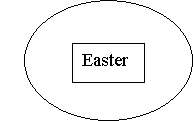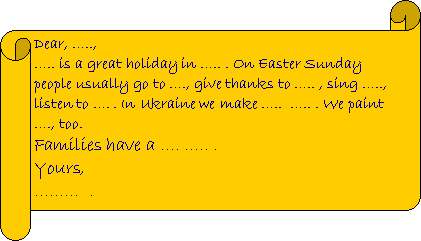Інсценізація народної англійської казки "Пряниковий чоловічок"
Сценарій англійської народної казки "Пряниковий чоловічок" для учнів 4 класу. Цікаві персонажі окрім того, що занурюють глядачів у казку, проводять різноманітні конкурси, що відповідають віковим особливостям дітей цієї вікової категорії, тим самим урізноманітнюючи захід. Присутня інтерактивність між глядачами та героями казки.
Підготувала вчитель англійської мови Акульшина Тетяна Станіславівна
Form: 5 A
Theme of the lesson: Easter Festival
Objectives :
- Ознайомити учнів зі звичаями та традиціями святкування Паски;
- Продовжувати формувати навички усного мовлення;
- Розвивати комунікативні здібності учнів;
- Розвивати мовну здогадку;
- Систематизувати та узагальнити уявлення учнів про святкування релігійних свят в Німеччині та Англії;
- Розширити інтеркультурну та країнознавчу компетенції учнів;
- Прищеплювати учням повагу до культурних надбань народу Німеччині та Англії;
- Виховувати інтерес до життя людей в інших країнах;
Equipment: проектор, магнітофон, магнітна дошка, писанки, костюми, HO.
Procedure
Easter Festival
- Greeting: Dear guests!
Winter has passed, the birds return,
There is the end of winter’s reign.
There is a way to the light!
Easter is a festival of hope and joy,
It’s a festival of awakening life!
|
The birds are singing
Plants and trees are growing
The frogs are leaping
The ants are crawling |
This is the season
The kids are playing
They’re all out singing
|
The group of students performs the song “Spring”.
Author 1: No matter what a person’s religion or nation is Easter is a great holiday for everybody. So, welcome to our festival dedicated to Easter Holiday.
Музичний супровід (великодні дзвони)
Author 1: Today we invited to our festival the representatives of England and Germany. Children in our school study the languages of these countries .They came to us to tell the interesting traditions of celebrating Easter in their countries.
Let’s greet our guests .This is Mary. She came from a beautiful country - England.
Mary: Hi! My name is Mary. I’m very happy to be present at your Easter Festival. Thank you very much for the invitations. I came here with my friends, here they are!
Author 2: And this is Albert. He came from a wonderful country, Germany.
Alfred: Guten Tag! Ich heiße Alfred. Ich freue mich sehr auf Ihrer Feier des Osterfest zu besuchen. Ich bin auch sehr denkbar für die Einladung. Meine Freunde sind auch mit mir.
(Доброго день!мене звати Альфред. Я дуже радий бути присутнім на вашому святі присвяченому Великодню. Я також дуже вдячний за запрошення.Мої друзі також зі мною).
Author 2: As you have already noticed, the name of the holiday in German and in English sounds alike, "Easter" and "Ostern". Would you like to get to know from Mary and Alfred the history of the holiday name.Alfred, bitte, erzähle uns über die Geschichte die Namen „Ostern“ und „Easter“ .(Альфред,розкажи,будь-ласка, про історію назв свята Великодня)
Alfred: Das deutsche Wort „Ostern“ und das englische „Easter“ haben die gleiche sprachliche Wurzel, da der Ursprung dieses Namens ist mit dem alten Festival namens Fruhlingspunkt, Ostara, verbunden.(Ostara, Ester,Easter, Eostra, griechisch Eos, das war die Gottin der Morgenröte).
(німецьке слово «Ostern» та англійське «Easter» мають однакові мовні корені, тому що походження цієї назви пов'язане зі стародавнім фестивалем дня весняного рівнодення Остара.)
Mary: Yes, I also know the history of this name. And Ostara is a day when the Dark and Light Forces are in harmony, and at the same time – the holiday of spring, the day of the world revival to a new life.
Author 1: Thank you, dears! It was very interesting .Now we have two words: Easter and Ostern. And here is the group of words from German and English. The words are mixed up. Guests from England should find the English words and stick them under the word Easter. The guests from Germany should find their words and put them in the right column, under Ostern.
![]()

|
das Fest, Spring, egg, Easter Bunny, die Kirche, Ostern Hase, das Ei , tradition, der Sonntag, church, der Brauch, Easter bells, lamb, Osterglocken, Sunday |
Author 2: And what can you say about the history of celebrating Easter itself?
Alfred: Mit einer großen Frohe will ich Ihnen davon erzählen und meine Freunde helfen mir. (З великим задоволенням я вам розкажу про це та мої друзі мені в цьому допоможуть)
Sch1: Ostern ist das älteste und höchste Fest der Christen. Das ist das Fest der Auferstehung von Jesu Christi.(Великдень це найстаріше та найважливіше свято християн. Це свято воскресіння Ісуса Христа).
Sch2:Ostern ist das Fest des neuen Lebens. Der Frühling kommt. In den Gärten, auf den Wiesen und Feldern grünt und blüht alles. Man feiert Ostern immer am Sonntag im März oder April. (Великдень це свято нового життя. Настає весна. У садках,на лугах та полях все зеленіє та квітне. Великдень святкують у неділю березня чи квітня)
Alfred: Und du, Mary, wisst du etwas über die Osternsymbole?
(А ти, Мері,знаєш щось про символи Великодня?)
Mary: Of course, I know. With the help of my friends I will tell you about three symbols of Easter. They are: egg, lamb and bunny.
Pupil 1: The ancient Egyptians believed the world began with enormous egg, thus most cultures around the world use the egg as a symbol of new life, and rebirth.
Pupil 2: Also eater eggs are common to during Eastretime, because they symbolize that Jesus rose from the grave as chicken from the egg.
Pupil 3: On Easter children get chocolate Easter egg. They are usually covered with brightly coloured silver paper. Also children make their own Easter egg buy drawing different signs on the eggs.
(Учні презентують писанки та розповідають про значення символів на них)
Physical warming
Clap your hands
|
Clap your hands – one, two, three. Clap your hands just like me.
Roll your hands – one, two, three. Roll your hands just like me.
Shake your hands – one, two, three.Shake your hands just like me.
Rub your hands – one, two, three. Rub your hands just like me.
|
Tap your knees – one, two, three. Tap your knees just like me.
Shake your hips – one, two, three. Shake your hips just like me.
Stamp your feet – one, two, three. Stamp your feet just like me.
|
Pupil 4: Little rabbits are usually called bunnies. As you know rabbits have large families. Certainly you know how fast little bunnies grow up and then have babies of their own. And most people believe that the rabbit of Easter is a symbol of new life.
Pupil 5: The lamb was often sacrificed as offerings to God by the Hebrews long before the first Passover. When Jesus died, he gave himself as an offering to God for the sins of the world. Early Christians then saw the lamb as a symbol of Jesus and used it for Easter celebration. Many people serve lamb as part of the Easter feast.
Author 1: Thank you Mary and your friends for telling us such interesting facts about the Easter symbols.
Now children let’s write a letter to Mary and tell her about celebrating Easter in Ukraine.
You have to complete the letter using the words from the Word Bank.
|
Word bank: Easter, Easter cakes, Ukraine, Christ, church, family, songs, eggs, big dinner, music
|


Author 2: Now I would like to let you know about some of the traditions of Easter celebrating.
Alfred, bitte, erzähle unsere Gäste über die Osterbräuche. (Альфред, розкажи,будь ласка про традиції святкування Великодня)
Alfred: Osterfest hat viele Bräuche, z.B. im Ostersamstag feiern man die Osterfeuer. (Святкування Великодня має багато стародавніх традицій. Наприклад, У суботу запалюють вогнище)
Sch1: Die Osterfeuer in der Nacht vor OsterSamstag auf OsterSontag macht. Man glaubte, das der Schien des Feuers eine reinigende Wirkung hätte und die keimende Saat vor bösen Geistern schütze.
Author 2: Danke. Kinder, wir haben einen Brief bekommen. Wollen wir lessen!
Hallo Kinder!
Ich bin ein Osterhase. Ich lebe in Deutschland. Ich bringe den deutschen Kindern die Ostereier. Vor Ostern bemale ich die Eier rot, gelb, grün. Dann verstecke ich sie im Garten. Die Kinder stehen auf, laufen in den Garten und suchen dort Ostereier. Sie finden viele Eier und sind froh darüber. Ich möchte wissen: wisst ihr warum verstecke ich sie im Garten. Und die Kinder suchen dort Ostereier?
Привіт,Дітки!Я Великодній заєць.Я живу у Німеччині. Я приносю дітям великодні яйця. Перед Великоднем я розмальовую їх у червоний,золотистий та зелений кольори. Потім ховаю їх у садку. Діти прокидаються зранку та біжать у садок шукати пасхальні яйця. Вони знаходять багато яєць та дуже цьому радіють. Я б хотів вас запитати чи знаєте ви чому я ховаю писанки ,а діти їх шукають?
Mary: We know the reason of this tradition and show the tale with the pleasure.
It is called Easter Adventure
Pupil 1: One sunny Easter morning
With a basket in his hands
The Rabbit walked. And he was going
To visit relatives and friends.
Bunny: It’s so nice I’m going to visit my friends!
Pupil 2: Blue and Yellow, white and red
Flowers nodded their heads.
The sun was brightly shining.
And our friend was smiling.
Pupil 3: A garland of violets on Rabbit’s head
Carrying a basket of chocolate eggs.
You are handsome, brother dear.
Cross the wood and do not fear!
Bunny: The wood is so beautiful!
Pupil 4: He met the Bear on the way.
Said "Good morning" to the friend,
Did not notice a stump,
Oh, dear! He fell down!
Pupil 5: What a pity! We are sorry!
Brother Rabbit, please, don’t worry!
Easter eggs and all the toys
Rolling down making noise.
Pupil 6: Poor rabbit has got afraid
And hasn’t received the first aid.
He has bumped his knee,
Jumped into the bushes under the tree.
Pupil 7: The children came into the wood.
They have seen the Rabbit’s foot
Hidden in the grass
And they began to laugh.
Pupil 8: "What are you doing here?"
Easter is near.
Morning bells are ringing.
All the children are singing".
Pupil 9: Then they picked the presents up
Ate some red cross buns,
Kissed the rabbit and began to play
Rolling eggs on green grass the whole day.
Easter Rabbit: Thank you, children. Happy Easter!
Alfred : Dieser Kinder erinnerte mich an ein gutes Gedicht über Ostern und Eier sammeln.
Das Osterei
Hei, juchhei! Kommt herbei !
Suchen wir das Osterei !
Immerfort, hier und dort
und an jedem Ort !
Ist es noch so gut versteckt,
endlich wird es doch entdeckt.
Hier ein Ei ! Dort ein Ei !
Bald sind's zwei und drei !
Wer nicht blind, der gewinnt
einen schönen Fund geschwind.
Eier blau, rot und grau
kommen bald zur Schau.
Und ich sag's, es bleibt dabei,
gern such ich ein Osterei :
Zu gering ist kein Ding,
selbst kein Pfifferling.
Easter Bunny: Have fun, everybody! Easter is a festival of hope and joy!
It is a festival of awakening life!
Preparing Easter cards.
Herzliche Ostergrüße
Ich wünsch euch viele, bunte Eier
und einen Tag mit Sonnenschein
und, dass ihr bei der Osterfeier
mit Freunden seid und nicht allein.
Frohe Ostern!
Easter greetings
May the angels protect you,
may the sadness forget you,
may goodness surround you,
& may God always bless you,
Happy Easter!
Song “Easter Bunny”
|
Easter Bunny Looking kind of funny With your basket of eggs Children singing 'What's the bunny bringing For me on Easter Day?"
Mom is cooking While we're out there looking For the eggs hidden away After church we Gathered 'round with family On this Easter Day
Two thousand years ago Jesus died for our sins Remember his resurrection And the joy it brings
Flowers blooming Springtime's looming Everything is coming alive Easter colors Yellow, blue and others Tell us Spring has arrived
|
Children are playing And everybody's saying "So good to see you today!" We're all together The merrier the better On this Easter holiday
Two thousand years ago Jesus died for our sins Remember his resurrection And the joy it brings
Flowers are blooming & Springtime's looming Oh what a wonderful day We're all together The more of us the better On this Easter holiday A lovely Easter holiday I like my Easter holiday
|
Summarizing: Children, our lesson comes to an end.
What did we do at the lesson today?
Did you like our lesson? What did you like most?
Can you make an Easter card now? I’ll ask the representatives of the group from Germany to present, give the cards to the pupils of the other group.
1


про публікацію авторської розробки
Додати розробку
